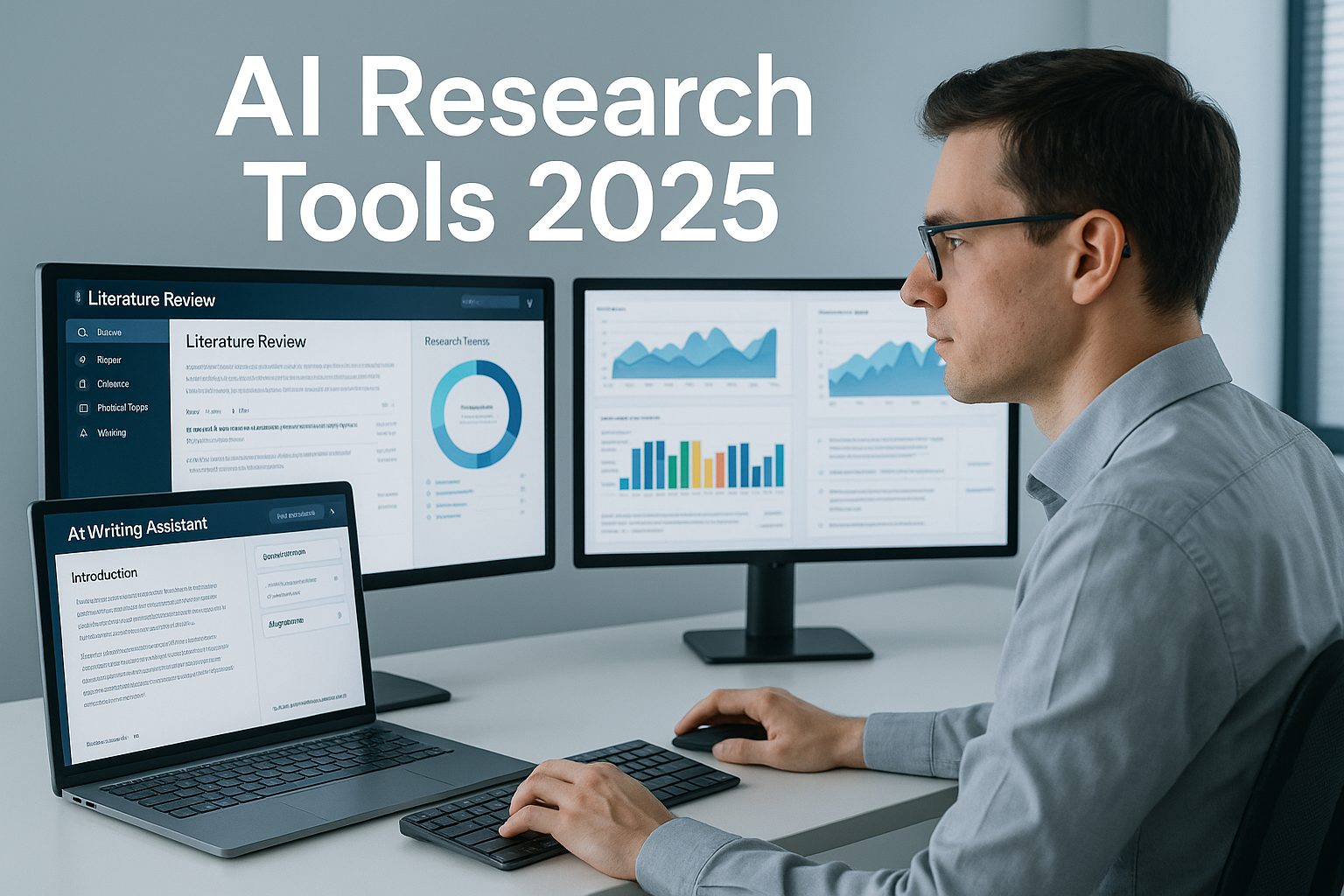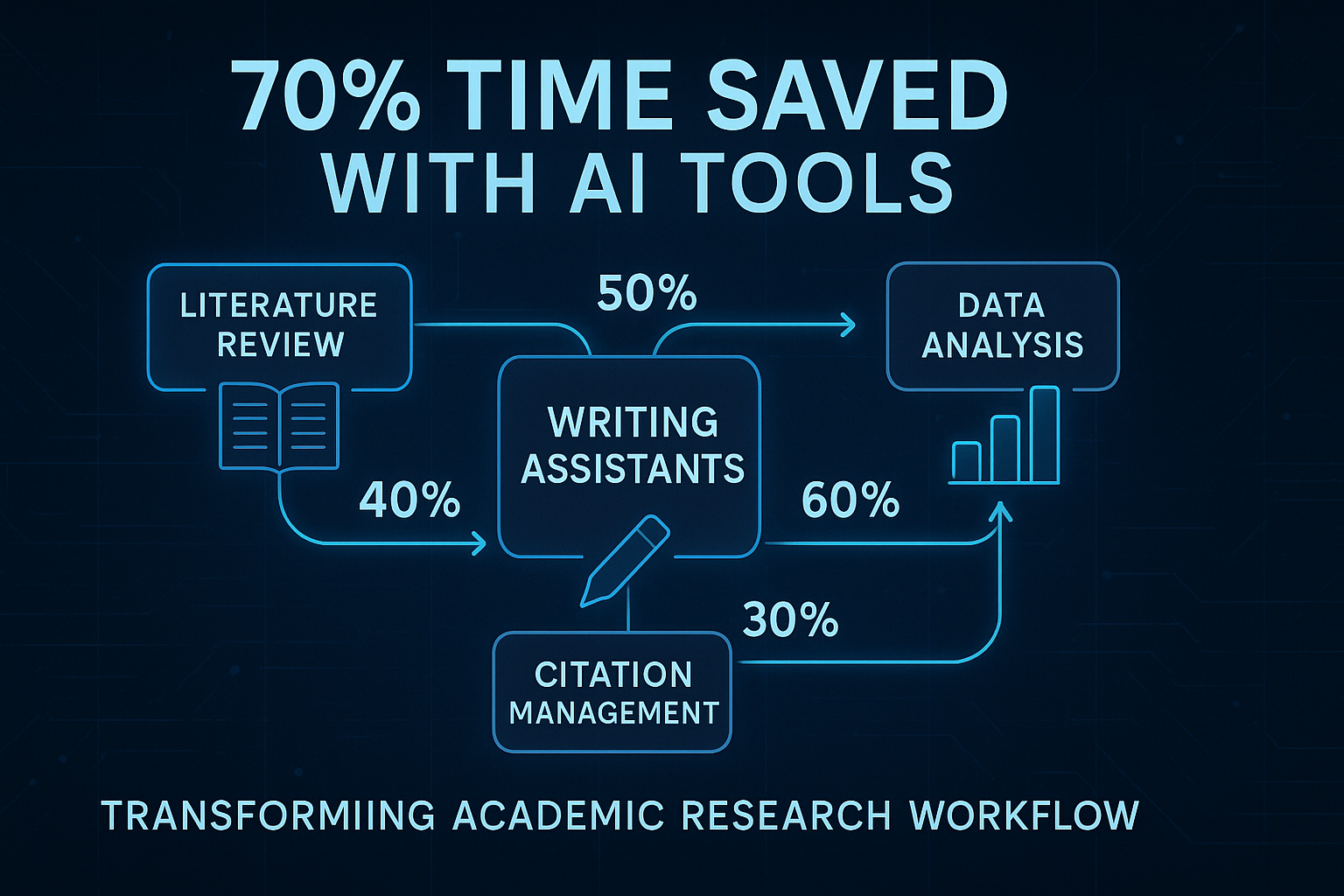How to Humanize AI Text and Avoid Turnitin's AI Detector



Transform your research workflow with cutting-edge AI technology that saves time and enhances quality.
Listen to our comprehensive guide while you read and discover how AI is transforming academic research!
Ever felt like you were searching for a needle in a global haystack of information? With over 3 million research papers published annually, the traditional, manual methods of academic research are no longer just inefficient—they're becoming impossible.
This information overload is precisely where Artificial Intelligence steps in, not as a replacement for the researcher, but as an indispensable partner.
AI tools are fundamentally reshaping the academic landscape by automating tedious tasks, uncovering hidden connections in data, and clearing the path for human intellect to do what it does best: innovate, question, and discover.

This guide will introduce you to the seven best categories of AI tools that are non-negotiable for competitive research in 2025.
From streamlining your literature review to ensuring academic integrity, you'll learn how to build a powerful, AI-driven workflow that saves up to 70% of your time and yields significantly better results.
This guide is tailored for anyone involved in the rigorous process of academic and scientific inquiry. You will find it particularly valuable if you are a:
AI is a powerful collaborator, not a replacement for your academic integrity. To use these tools responsibly, you must:
The literature review is the foundation of all research, but it's often the most time-consuming part. AI tools can analyze thousands of papers, identify key themes, and even pinpoint research gaps in a fraction of the time it would take a human.
| Feature | Benefit | Time Saved |
|---|---|---|
| Smart Search | Finds relevant papers using semantic understanding, not just keywords. | 70% |
| Auto-Summarization | Creates concise summaries of lengthy papers. | 80% |
These tools go far beyond simple spell-checking. They help improve clarity, maintain a consistent academic tone, and even suggest ways to structure your arguments more effectively, ensuring your writing is as impactful as your research.
| Benefit | Impact | Example |
|---|---|---|
| Tone Consistency | Maintains a professional academic voice. | Converts casual language to scholarly terms. |
| Clarity Enhancement | Improves readability and flow. | Simplifies complex technical explanations. |
You don't need to be a data scientist to draw powerful insights from your data. AI tools can automatically identify patterns, suggest appropriate visualizations, and even generate narrative summaries of your findings, making complex data analysis accessible to all researchers.
This card layout shows that while traditional tools may have a slight edge in raw accuracy, AI tools dominate in speed and ease of use, improving workflow efficiency.
Managing citations and ensuring academic integrity are non-negotiable. AI tools automate the tedious process of formatting bibliographies and provide a powerful defense against accidental plagiarism by understanding context, not just matching text.
| Traditional Checkers | AI-Enhanced Checkers | Key Advantage |
|---|---|---|
| Text matching only | Semantic analysis | Detects paraphrased content |
| Simple highlighting | Context understanding | Reduces false positives |
Instead of a live calculator, here is a decision-making guide to help you choose the right tool based on your needs.

IF your current stage is Literature Review... AND your priority is Speed & Efficiency...
THEN consider: Elicit and Connected Papers for rapid discovery and mapping of research fields.
Let's see the potential savings with a typical scenario:
Resulting Savings: You could save approximately 13 hours per week, a value of $520 per week or over $25,000 per year in productivity gains.
The academic research landscape is experiencing a revolutionary transformation. Here are the essential insights every researcher needs to know:
🔥 Bottom Line
The researchers who embrace these AI tools today will have significant competitive advantages tomorrow. The technology isn't replacing human intelligence—it's amplifying it, allowing you to focus on creative thinking and breakthrough discoveries.
Start small, think big, and let AI accelerate your research journey! 🚀
Dive deeper into the specific AI tools that can revolutionize your literature review process, from smart search to automated summarization.
Read More →Learn how to transform your writing process with AI assistants that improve clarity, tone, and structure, helping you publish faster.
Read More →Unlock the power of conversational AI to interact directly with your research papers, asking questions and getting instant insights from any PDF.
Read More →The future of academia is here. Don't get left behind. Start by integrating just one of these tools into your workflow and experience the difference.
Pick Your First ToolMany excellent AI research tools offer free tiers or academic discounts. Semantic Scholar and Connected Papers are completely free, while Zotero offers powerful reference management at no cost. Tools like Grammarly and QuillBot provide affordable premium features for students.
AI-enhanced plagiarism detection tools are significantly more accurate. They can identify paraphrased content, structural similarities, and even AI-generated text. Tools like Turnitin's AI detection achieve over 95% accuracy, catching sophisticated paraphrasing that would bypass traditional checkers.
No, AI tools are designed to augment human intelligence, not replace it. They handle routine tasks, but human expertise remains crucial for critical thinking, hypothesis formation, and creative problem-solving. The best approach is to use AI as an intelligent assistant under human oversight.
Grammarly's Academic Writing mode is specifically designed for scholarly work. Writefull focuses on academic language patterns and is great for non-native English speakers. QuillBot offers excellent paraphrasing while preserving academic integrity. The best choice depends on your specific needs.
AI tools like Tableau offer user-friendly interfaces and automated insights, making complex analysis accessible. Traditional software like SPSS and R provide more granular control. Many researchers use AI tools for initial exploration and traditional software for detailed statistical validation.
Yes, privacy is a legitimate concern. Always review the terms of service before uploading sensitive data. Look for tools that offer local processing or data encryption. Many platforms now offer enterprise versions with enhanced privacy protections for institutions.
Most modern AI tools are designed with intuitive interfaces. Basic features can typically be mastered in 1-2 hours. Start with one tool at a time, use available tutorials, and gradually expand your toolkit. Many offer free trials to ease the transition.
Maintain integrity by properly attributing AI assistance in your methodology, verifying all AI-generated information against primary sources, and never presenting AI-generated content as original work. Always check your institution's specific policies on AI tool usage.
Expect advances in multimodal AI (processing text, images, and data simultaneously), personalized research assistants that learn your work patterns, and better integration between tools. We will also see improvements in real-time fact-checking and even AI-powered peer review assistance.
Comments
Post a Comment